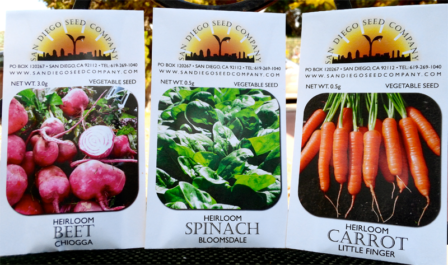Something Special about Seeds
The Mission Hills Garden Club met in September (we meet on the odd-numbered months) at
the Mission Hills Nursery to hear Brijette Romstedt tell us really interesting facts about seeds. Romstedt believes that seeds provide “a window to the past and a door to the future.” Her company, San Diego Seed Company, is the only urban seed producer in San Diego. She has local farm areas in myriad microclimates of San Diego County, from the Coast to the desert. She augments her hands-on knowledge by collaborating with other seed collectors. Her goal is to grow, process and sell organic local seeds while encouraging gardening and educating the public by sharing her vast compilation of information.
Seeds are important because of their over-lap in methods of producing organic food, the creation of regionally adapted varieties of seeds, and managing and sustaining resources. She continued to explain that local seed production increases diversity of plants. Seed banks saves varieties from extinction. Collecting seeds is a way of creating varieties that are adapted to specific regions. Creating a flow of local, fresh seeds encourages economic, cultural and social benefits. Producing seeds on a small scale enables more specificity while helping to educate farmers, growers, and gardeners.
Romstedt went on to give us a bit of the seed industry’s history. There was no such thing 150 years ago. People saved seeds from crops they liked; they shared with friends. It was always farm by farm. In 1850 the US Patent and Trade office began a massive seed sharing hoping encourage access to food and thus population growth. Hybrids entered the seed market in the early 20th century. Seed company representatives wiped out the government distribution programs by claiming that providing free seeds was unfair competition.
After World War II saw a boom in the seed industry from both public and private collaborations. Seed companies began consolidating in 1960. On June 16, 1980 the Supreme Court ruled that genetic material could be owned. “This led to a shift from public industry to a few multinational companies,” such as Monsato, DuPont, Syngenta, Land o’ Lakes and others. Monsato has the lions’ share of the vegetable seed market. Fortunately, the controversy over who owns what plus other factors led hundreds of small seed companies to form. Urban farmers helped the smaller seed industries like Baker Creek Heirloom Seed Company, Seed Savers Exchange, High Mowers, Sustainable Seed Company, and San Diego Seed Company.
Romstedt gave us some terms to know about seeds. For beginners, heirloom plants’ seeds are safest for saving. This ensures your seed will produce what you wanted. A hybrid will give you some of what one of its parents had, but not both parents’ characteristics.
For duplicate plants, you must avoid cross-pollination. Some plants, like squash, have both male and female parts within it for reproduction. Some flowers are female; some are male. Insects may carry the pollen from a male flower to a female resulting in pollination. Spinach is a species that grows female flowers on one plant and male on another. Plants can be pollinated by insects, birds, wind, and artificial pollination. This is often done with a brush taking the pollen from a female blossom to a male plant or blossom.
We had a wonderful discussion of how to save tomato seeds. That will appear in December when we have no meeting. November’s meeting will be on the 15. David Root will give a presentation of holiday décor and some of his creations will be offered as prizes. This meeting is also the holiday party. It will be held at Mission Hills Nursery, 1525 Fort Stockton Drive from 6 until 8 p.m. Members are free, but guests will be charged.

Producing seeds on a small scale enables more specificity while helping to educate farmers, growers, and gardeners.
Category: Business, Events, Local News







